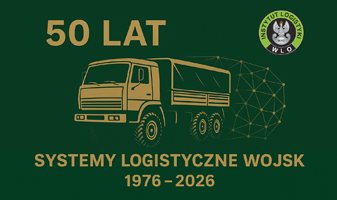ORIGINAL PAPER
Logistic business continuity in terms of information efficiency
1
Wojskowa Akademia Techniczna, Wydział Bezpieczeństwa, Logistyki i Zarządzania, Instytut Organizacji i Zarządzania
A - Research concept and design; B - Collection and/or assembly of data; C - Data analysis and interpretation; D - Writing the article; E - Critical revision of the article; F - Final approval of article
Submission date: 2021-09-24
Acceptance date: 2021-12-31
Publication date: 2021-12-31
Corresponding author
Piotr ZASKÓRSKI
Zakład Systemów Zarządzania, Wydział Bezpieczeństwa, Logistyki i Zarządzania WAT INSTYTUT ORGANIZACJI I ZARZĄDZANIA, Kaliskiego 2, 00-908, Warszawa, Polska
Zakład Systemów Zarządzania, Wydział Bezpieczeństwa, Logistyki i Zarządzania WAT INSTYTUT ORGANIZACJI I ZARZĄDZANIA, Kaliskiego 2, 00-908, Warszawa, Polska
SLW 2021;55(2):173-192
KEYWORDS
TOPICS
ABSTRACT
The article intends to make a kind of retrospection related to the author's personal, longstanding experience in designing and implementing many IT systems supporting logistics processes in the Polish Armed Forces and in the national economy. Retrospection enriched with many modern technological solutions sets out several information strategies, the framework of which allows to ensure the continuity of logistics systems in complex organizations and in relation to individual customers. Therfore, the so-called "info-preformism" referring to the universal attributes of the logistics information system and the expectations of the end user is emphasized, but with a strong verification of their accuracy at a specific time and place through the use of own and collected information resources in cyberspace, as well as the use of advanced models of their exploration to generate knowledge, which ensure the security and continuity of the complete supply chain. Therefore, the article addresses a research problem related to the possibility of ensuring the continuity of logistics through the wide use of modern ICT solutions that improve information processes. Therefore, a hypothesis was adopted about the strong impact of this class of solutions on the functioning of the entire logistics system of any entity. The aim of the research is directly related to the verification of the adopted hypothesis, which was illustrated by the use of the method of system analysis and modeling of universal solutions. The presented information strategies constitute a logical development sequence of information systems and define the stages of creating comprehensive tools supporting various areas and phases of logistics operation. The presented IT tools are an important component of modern logistics systems, strengthening their efficiency as well as usability, functionality and reliability.
We process personal data collected when visiting the website. The function of obtaining information about users and their behavior is carried out by voluntarily entered information in forms and saving cookies in end devices. Data, including cookies, are used to provide services, improve the user experience and to analyze the traffic in accordance with the Privacy policy. Data are also collected and processed by Google Analytics tool (more).
You can change cookies settings in your browser. Restricted use of cookies in the browser configuration may affect some functionalities of the website.
You can change cookies settings in your browser. Restricted use of cookies in the browser configuration may affect some functionalities of the website.


